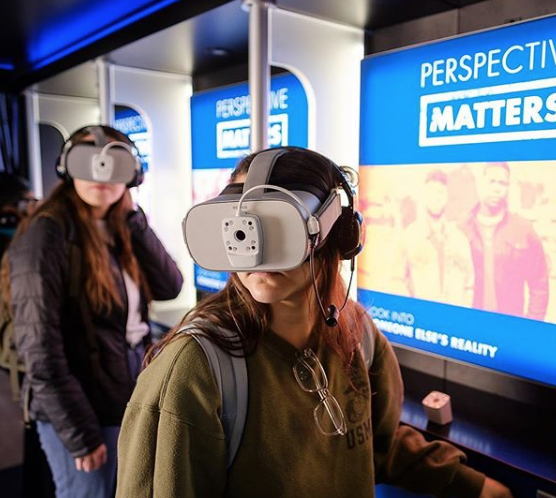On Monday, Feb. 18, the CEO Action Check Your Blind Spots Unconscious Bias Tour visited Wake Forest. The tour bus, which contained several different educational and interactive modules and activities that informed people about unconscious bias, was open to the public in Lot N, known as Kitchin Circle, from 10:30 a.m. to 3:30 p.m.
The goal of the tour was to provide an opportunity to gain insight into the unconscious biases people encounter on an everyday basis, to learn about potential actions to alleviate the issue of unconscious bias and to commit to improving one’s approach to unconscious bias by signing the I Act On pledge.
José Villalba, vice president for Diversity and Inclusion and chief diversity officer, commented on how the Check Your Blind Spots Tour contributes to Wake Forest’s aims of achieving diversity and inclusion on campus.
“I think experiences such as the tour present members of our community with a chance to engage in diversity and inclusion discussions,” said Villalba. “The interactive and informative nature of the bus, both multi-sensory and heterogenous, lets the participant process the information with breadth and/or depth.”
“Overall, I think these sorts of events and opportunities impact our community in a positive way, not because these discussions are always pleasant or interesting, but because the more we explore inclusion and equity, the more we will value each other and our contributions to our campus environment,” said Villalba.
Through informational and engaging modules titled “Wake-Up Call,” “Look Through a Different Lens,” “Face Yourself, Face Reality,” “What Does Your Network Look Like?” and “Perspective Matters,” participants were encouraged to identify instances of unconscious biases and grapple with the presence of sexual, racial, gender or cultural stereotyping that appeared in realistic scenarios.
Tour Manager Ryan Mosher explained that even though people encounter biases on a regular basis, it is important to spread awareness of these biases in order to encourage others to engage in preventative measures or action against these biases.
“The tour shows biases that other people experience on a daily basis and shows how many different biases there are against everyone,” said Mosher.
Moving through the stations on the bus, one was able to gain a wider perspective on the variety of biases that unconsciously appear throughout daily life and to think about ways to challenge these biases.
For instance, the first station on the bus was called “Wake Up Call,” which consisted of red phones that played back a message between neighbors about an unconscious bias against a section of the neighborhood.
“Look Through a Different Lens” was the next station, which demonstrated the roles of both explicit and implicit bias through a role-play of a discussion between two friends. The viewer was then asked to identify moments of bias in the conversation, like cultural stereotypes about a dining choice or personal stereotypes about who to invite.
Another module, called “Face Yourself, Face Reality” presented the viewer with videotaped statements from several different types of people, including a girl with physical deformations, an African American male, a Muslim woman wearing a hijab, an Asian woman and a transgender individual. These people all commented on the importance of delving beyond an initial impression or unconscious bias to discover the true personality of someone.
The girl with physical deformations said, “I’d rather you be curious than make an assumption about who I am. Yes, I have a disability. No, it does not define me, because we are more than the sum of our parts.”
One of the most popular activities was a virtual reality experience called “Perspective Matters,” where people could don a headset and adopt the perspective of someone experiencing racial or cultural bias.
These experiences all highlighted the issues with unconscious bias and how the general public needs to take steps to address this issue.
One of the foundational principles of the Check Your Blind Spots Tour is holding people accountable through two pledges: the CEO pledge and the I Act On pledge.
“The pledge to offer diversity and inclusion training at their business gives people the space to have tough conversations and share the feedback to the CEOs as a group so, as a coalition, they can all move forward together,” said Mosher.
President Nathan Hatch recently signed onto the CEO pledge, joining nearly 600 other CEOs and companies who have pledged to incorporate unconscious bias education into their workplaces and transform the environment into a more trusting and inclusive atmosphere.
In addition, many Wake Forest students signed the I Act On pledge, committing to personal improvement of recognizing biases and spreading awareness. Students who signed the pledge join over 15,900 signatures on the I Act On pledge.














